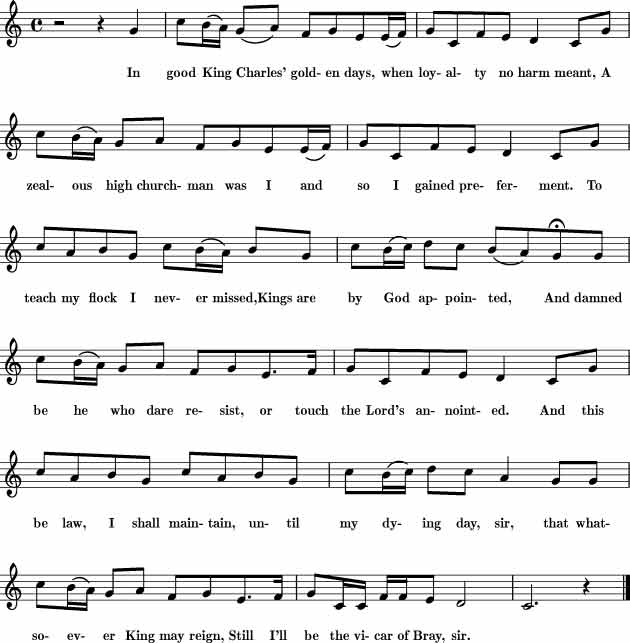A Rendering of the Song “The Vicar of Bray”.
“The Vicar of Bray” is a satirical song.
It refers to the real-life Vicar of St Michael’s Church, Bray, Berkshire.
The Wikipedia website has a lengthy article about the song which it describes as recounting the career of The Vicar of Bray and his contortions of principle in order to retain his ecclesiastic offices, despite the changes in the Established Church through the course of several English Monarchs, and gives a detailed analysis of the allusions to English religious and political doctrines and events crammed into it.
The Vicar of Bray alluded to was Simon Alleyn, or Allen, who held his place from 1540 to 1588. He was a Papist under the reign of Henry the Eighth, and a Protestant under Edward the Sixth. He was a Papist again under Mary, and once more became a Protestant in the reign of Elizabeth. When this scandal to the gown was reproached for his versatility of religious creeds, and taxed for being a turn-coat and an inconstant changeling, as Fuller expresses it, he replied: ‘Not so neither; for if I changed my religion, I am sure I kept true to my principle, which is to live and die the Vicar of Bray.’”—Disraeli.
At the time these comments would apply, equally, to the Welsh churches which were governed by the Church of England. As mentioned in the section on the 14th, 15thand 16thcenturies of St Cybi’s history in his article in Archeologia Cambrensis, Edward Owen considered Sir William Roberts, the first vicar of St Cybi’s after the Dissolution, to be “of the Vicar of Bray order”.
This version of the lyrics, there are others, is taken from the Wikipedia website:
In good King Charles’golden time, when loyalty no harm meant,
A zealous high churchman was I, and so I gained preferment.
To teach my flock, I never missed: Kings are by God appointed
And damned are those who dare resist or touch the Lord’s anointed!
(Chorus)
And this be law, that I’ll maintain until my dying day, sir
That whatsoever king may reign, Still I’ll be the Vicar of Bray, sir.
When royal Jamespossessed the crown, and poperycame in fashion,
The penal lawsI hooted down, and read the Declaration.
The Church of Rome, I found, did fit full well my constitution
And I had been a Jesuit, but for the Revolution.
When Williamwas our King declared, to ease the nation’s grievance,
With this new wind about I steered, and swore to him allegiance.
Old principles I did revoke; Set conscience at a distance,
Passive obediencewas a joke, a jest was non-resistance.
When Royal Annebecame our queen, the Church of England’s glory,
Another face of things was seen, and I became a Tory.
Occasional conformistsbase; I blamed their moderation;
And thought the Church in danger was from such prevarication.
When Georgein pudding time came o’er, and moderate menlooked big, sir
My principles I changed once more, and I became a Whig, sir.
And thus preferment I procured From our new Faith’s Defender,
And almost every day abjuredthe Popeand the Pretender.
The illustrious House of Hanoverand Protestant succession
To these I do allegianceswear – while they can hold possession.
For in my faith and loyalty I never more will falter,
And Georgemy lawful king shall be – until the times do alter.
